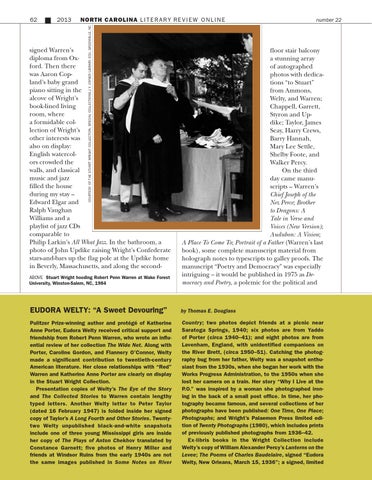2013
NORTH CAROLINA L I T E R A R Y RE V I E W O N L I N E Courtesy of the Stuart Wright Collection, Special Collections,J.Y. Joyner Library, ECU, Greenville, NC,
62
signed Warren’s diploma from Oxford. Then there was Aaron Copland’s baby grand piano sitting in the alcove of Wright’s book-lined living room, where a formidable collection of Wright’s other interests was also on display: English watercolors crowded the walls, and classical music and jazz filled the house during my stay – Edward Elgar and Ralph Vaughan Williams and a playlist of jazz CDs comparable to Philip Larkin’s All What Jazz. In the bathroom, a photo of John Updike raising Wright’s Confederate stars-and-bars up the flag pole at the Updike home in Beverly, Massachusetts, and along the second-
number 22
ABOVE Stuart Wright hooding Robert Penn Warren at Wake Forest University, Winston-Salem, NC, 1984
floor stair balcony a stunning array of autographed photos with dedications “to Stuart” from Ammons, Welty, and Warren; Chappell, Garrett, Styron and Updike; Taylor, James Seay, Harry Crews, Barry Hannah, Mary Lee Settle, Shelby Foote, and Walker Percy. On the third day came manuscripts – Warren’s Chief Joseph of the Nez Perce; Brother to Dragons: A Tale in Verse and Voices (New Version); Audubon: A Vision; A Place To Come To; Portrait of a Father (Warren’s last book), some complete manuscript material from holograph notes to typescripts to galley proofs. The manuscript “Poetry and Democracy” was especially intriguing – it would be published in 1975 as Democracy and Poetry, a polemic for the political and
EUDORA WELTY: “A Sweet Devouring”
by Thomas E. Douglass
Pulitzer Prize-winning author and protégé of Katherine Anne Porter, Eudora Welty received critical support and friendship from Robert Penn Warren, who wrote an influential review of her collection The Wide Net. Along with Porter, Caroline Gordon, and Flannery O’Connor, Welty made a significant contribution to twentieth-century American literature. Her close relationships with “Red” Warren and Katherine Anne Porter are clearly on display in the Stuart Wright Collection. Presentation copies of Welty’s The Eye of the Story and The Collected Stories to Warren contain lengthy typed letters. Another Welty letter to Peter Taylor (dated 16 February 1947) is folded inside her signed copy of Taylor’s A Long Fourth and Other Stories. Twentytwo Welty unpublished black-and-white snapshots include one of three young Mississippi girls are inside her copy of The Plays of Anton Chekhov translated by Constance Garnett; five photos of Henry Miller and friends at Windsor Ruins from the early 1940s are not the same images published in Some Notes on River
Country; two photos depict friends at a picnic near Saratoga Springs, 1940; six photos are from Yaddo of Porter (circa 1940–41); and eight photos are from Lavenham, England, with unidentified companions on the River Brett, (circa 1950–51). Catching the photography bug from her father, Welty was a snapshot enthusiast from the 1930s, when she began her work with the Works Progress Administration, to the 1950s when she lost her camera on a train. Her story “Why I Live at the P.O.” was inspired by a woman she photographed ironing in the back of a small post office. In time, her photography became famous, and several collections of her photographs have been published: One Time, One Place; Photographs; and Wright’s Palaemon Press limited edition of Twenty Photographs (1980), which includes prints of previously published photographs from 1936–42. Ex-libris books in the Wright Collection include Welty’s copy of William Alexander Percy’s Lanterns on the Levee; The Poems of Charles Baudelaire, signed “Eudora Welty, New Orleans, March 15, 1936”; a signed, limited
